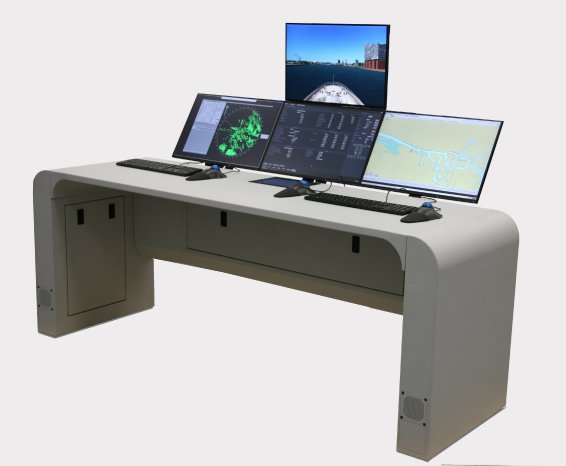History and challenges in the project
The need to regenerate existing systems and procure new systems in the area of technical navigation training was identified at an early stage. Following the necessary procedures, the naval schools and flotillas defined functional requirements. This resulted in the project "Regeneration AATN".
A key success factor in the implementation was the agile and iterative interaction between the various users and participants in the project, from the design phase to the development and testing phase. This made it possible, among other things, to incorporate important technical changes from other parallel projects (such as RadEA) and, as "pioneers", to realize a construction project on naval property by creating a temporary infrastructure.
Benefits of the AATN
The AATN handed over to the NAVOS is a classroom trainer with 20 student workstations and one instructor workstation dedicated to the training of naval soldiers, which virtually simulates all German Navy ships and relevant sea areas. The NAVOS primarily offers tactical, navigational and radio communications training for future operators of a warship, including trainees from foreign navies as part of exchange programs. The AATN in Bremerhaven enables interdisciplinary nautical training for all naval services throughout all ranks for the approximately 3,000 soldiers who go through the NAVOS every year.
With a focus on technical navigation using electronic chart systems (including the military warship ECDIS "ECPINS" by the Canadian company OSI Maritime Systems, which was selected as part of RadEA) and various radar surfaces, these simulators also offer the opportunity to realistically teach content in terrestrial and astronomical navigation, nautical law, military procedures, ship-handling and basic seamanship such as maneuvering in port, towing or being towed. At the same time, the simulator meets the high standards and requirements for information security in accordance with the BSI (German Federal Office for Information Security) guidelines.
Rollout and Way Ahead
In addition to the NAVOS Bremerhaven as the first user, the Naval Academy Mürwik (NAVAC) and the naval bases in Wilhelmshaven, Kiel, Eckernförde and Warnemünde will receive their own AATN in different configurations in order to enable a decentralized training.
The rollout of the simulators continues this summer with Eckernförde and with Warnemünde in winter. Rheinmetall is thus increasing its reach and visibility within the training landscape of the German Navy with the aim of providing future Navy crews with a sophisticated and state-of-the-art training.
"Pursuant to the stipulations of the European General Data Protection Regulation (GDPR), we wish to inform you that you have received this e-mail in a mailing addressed to persons and organizations on our press distribution list. In order to do this, we have entered your e-mail address, and possibly other contact data, into our data base. Protecting your data is very important to us. If you wish, we would be pleased to let you know what information we are storing. If you do not want us to use your data for press- and public relations-related purposes, please let us know. We will then be happy to delete your data and take you off our distribution list."


